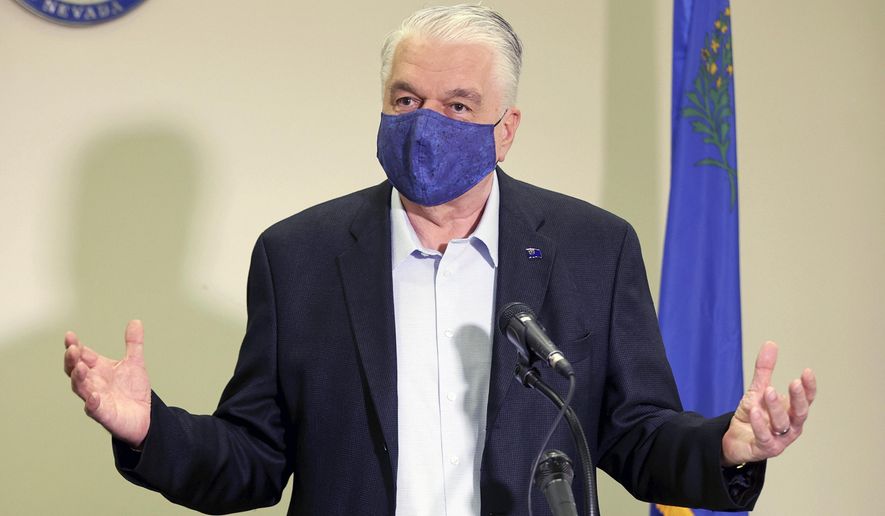CARSON CITY, Nev. (AP) - Gov. Steve Sisolak outlined plans Tuesday to spur job growth and attract new industries to Nevada as the coronavirus pandemic continues to wreak havoc on the state’s tourism-driven economy.
In his prerecorded State of the State address, the first-term Democrat proposed investing heavily in job training, infrastructure and renewable energy to stimulate Nevada’s economy both during and after the pandemic. He described the virus as “challenging,” “excruciating” and “unprecedented” for families and businesses, said it was urgent that students to return to school for in-person learning and conceded that the struggle was far from over.
“It’s not enough to just aim for a full reopening of our current economy. We must look forward to the kind of economy that will let our state prosper in the future,” the governor said.
Since March, the coronavirus has infected more than 1 out of every 12 Nevadans and laid off almost as many workers. The state relies heavily on tourism and hospitality to power its economy and underwrite spending, but with overall visitor volume down in Las Vegas, it has faced one of the nation’s most severe budget crises.
Unemployment spiked to 30.1% in April, the highest reported in any state in history. Jobs returned slowly in the following months and the unemployment rate in November 2020 was 10.1%. The economic development proposals and the entire budget for the upcoming two-year cycle hinge on how quickly vaccines are distributed, which Sisolak said was currently his most important task.
“The quicker we can do that, the quicker we can get people back to work, the quicker we can get business back - people coming to town and getting things done,” he said.
The governor said a portion of the jobs lost to the pandemic wouldn’t return as businesses move toward automation. His development plans would generate an estimated 165,000 jobs in the coming decade, helping diversify the state’s economy and decrease its dependence on tourism, he said.
To expand beyond casinos and hospitality, Sisolak committed to working with lawmakers on policies geared toward increasing Nevada’s transmission, storage and distribution of clean energy.
The governor did not include details about his proposed legislation but said it would help develop new industries like electric vehicle infrastructure, component manufacturing and mining of lithium, a key component in rechargeable batteries, including those that power electric cars.
The governor also proposed the creation of “Innovation Zones,” campuses designed to allow startups, research and new technology to flourish. He said the zones would provide a “jumpstart” to businesses that meet certain benchmarks but would not involve taxpayer funding or tax abatements, like the roughly $1.25 billion in rebates that Gov. Brian Sandoval’s administration offered to lure Tesla to northern Nevada.
Sisolak said one firm, Blockchains, LLC, has committed to “create a small city in northern Nevada that would fully run on blockchain technology,” once the legislation passes, bringing high-paying jobs and tax revenue with it.
Blockchain is a digital ledger that records transactions of cybercurrencies, such as Bitcoin.
To ready Nevada’s workforce, Sisolak proposed a program called Nevada Job Force in which companies would fund, design and run job training programs. With many workers expected to continue working from home post-pandemic, he said he wants to establish a resource center connecting Nevadans with remote work around the world.
He also plans to ask the Nevada System of Higher Education to help spinoff the state’s community colleges into an independent body focused on job readiness and union apprenticeship program. He said the proposal differed from trade schools, but would similarly train students to be work-ready, with a particular focus on skills that will modernize the state’s workforce.
The governor also acknowledged the state’s badly hampered and backlogged unemployment insurance system, which left those out of work waiting months for relief. Sisolak said the backlog has been reduced by 95% but the Department of Employment, Training & Rehabilitation needs a better system, including updated computers, which he’ll ask lawmakers to tackle.
Instead of the traditional in-person address in front of lawmakers at the Capitol, Sisolak’s speech released online Tuesday included short video clips sprinkled throughout, featuring remarks from a Nevada doctor, a teacher, a restaurant owner and a plea for bipartisan cooperation that included Sandoval, Sisolak’s Republican predecessor, and GOP state Sen. Ben Kieckhefer of Reno.
Assembly Minority Leader Robin Titus, a doctor from Wellington, provided the Republican response in which she didn’t mention Sisolak by name but admonished “draconian policies that decimated our private sector” and “mismanagement of government agencies.”
“Harsher restrictions will once again cause declining sales and revenue for local businesses and an increase in unemployment - our state cannot afford this,” she said.
___
Price reported from Las Vegas. Metz is a corps member for the Associated Press/Report for America Statehouse News Initiative. Report for America is a nonprofit national service program that places journalists in local newsrooms to report on undercovered issues.




Please read our comment policy before commenting.